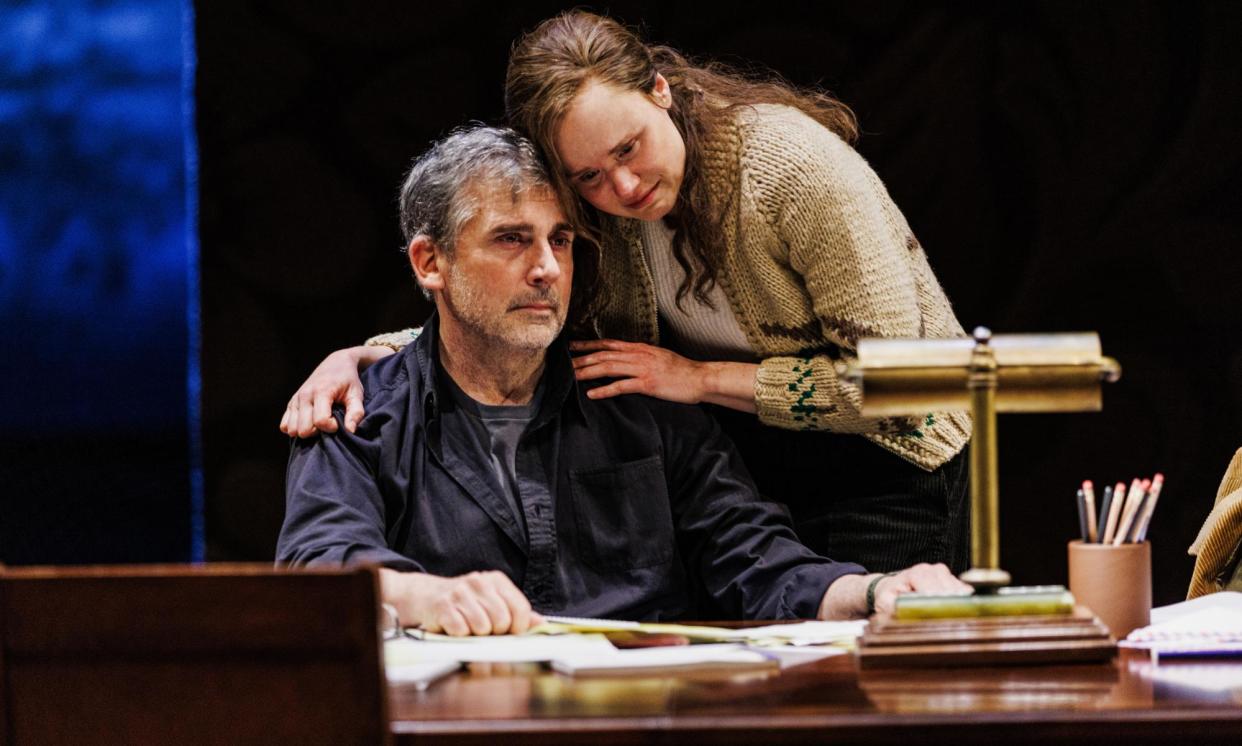Uncle Vanya review – Steve Carell leads excellent cast in Chekhov reimagining

As with Appropriate, another outstanding, claustrophobic family drama directed by Lila Neugebauer on Broadway this season, the new Broadway revival of Uncle Vanya, now playing at Lincoln Center, plays to the sound of oppressive heat. The trill of crickets, the buzz of cicadas – from the first minute, the setting is effectively muggy, at once nostalgic and portentous. (Mikhail Fiksel and Beth Lake did the sound design.) It’s the country, and the characters of Anton Chekhov’s pastoral drama of discontents wear the bucolic setting uncomfortably. In this adaptation of the 1898 play by the playwright and translator Heidi Schreck, one recalls another, more recent time of entrapment with a motley crew of relatives and friends, itchy for escape, or something more.
Related: Mary Jane review – Rachel McAdams makes a magnetic Broadway debut
Chief among the grumbles is Uncle Vanya, the manager of a country estate capably played by Steve Carell in his Broadway debut. Carell, primarily known for his comic roles, leans into the bathos of a middle-aged man’s petty grievances and dyspeptic musings; his Vanya has a mischievous wink to his digs and precise comic timing, particularly when it’s at the expense of Professor Alexander (Alfred Molina, also quite funny as an out-of-touch narcissist in ill health). The Professor and his much younger, beautiful wife Elena (Anika Noni Rose) have lived off the estate’s profits in the city (formerly Moscow, but not named here) for years, but have returned for an indefinite convalescence, upending everyone’s fragile contentment – that of Vanya, who is in love with Elena and bored to tears; Elena, who is also bored to tears; provincial Dr Astrov (The Good Place’s William Jackson Harper, a standout in this celebrity cast), who is also in love with Elena; and Sonia (Alison Pill), who is hopelessly in love with Astrov.
Schreck, author of What the Constitution Means to Me, spent time as a teacher and journalist in St Petersburg, and has a clear grasp on the spirit of Chekhov’s material. This translation sounds as natural to the present day as about anything else on Broadway, even if the economics of the set-up feel vaguely 19th century. The sets, by Mimi Lien, and costumes, by Kaye Voyce, look modern but indistinct – Columbia-esque outdoors clothes, a pair of scrubs for Dr Astrov, a sparse outdoor set of picnic tables that gives way, after intermission, to a luscious indoor one of mid-century mahogany furniture.
The effect is less vague than timeless – in the country, alone at night, with drink (vodka, naturally), it could be now or 50 years ago. Or, as Vanya at one point laments, “modernism, postmodernism, all that crap”. Schreck’s translation, coupled with Carell’s comic undertones, add a distinctly contemporary current of irony to everyone’s growing crises of purpose. “It’s stupid that I’m still alive,” Carell’s Vanya bemoans, half serious and half joke.
Carell is in his element in this register, a very distant cousin of the abrasive yet endearing Michael Scott. Adept at projecting heart, even in a grumpy slouch or sad-drunk frolic with Dr Astrov (a crowd-pleaser at the performance I attended), Carell plays Vanya as a wounded, occasionally sweet man with a voracious, all-too-human victim complex. As Vanya’s frustrations and resentment crescendo into a portrait of pathetic rage, Chekhov’s prop gun in hand, Carell can’t help but imbue his implosion with amiable pity, against a backdrop of symbolic tapestry, ragged at the edges and unraveling toward the ceiling.
Still, it’s Harper who I will remember the most, projecting Astrov’s crisis of purpose and attraction both staggering drunk and scared sober. He’s the most naturalistic of these all-around convincing performers, including Jayne Houdyshell, Jonathan Hadary and the excellent Mia Katigbak. Pill’s performance as Sonia, Astrov’s friend and yearning, would-be lover, teeters between endearing naivety and intensely physical, too twee awkwardness. But their scenes together – two characters talking around the point yet stumbling, physically, into some expression of their appreciation for each other – are some of the best in this adaptation.
The famous misreading of Chekhov is that nothing happens in his plays. People talk, people stew, people fight; life goes on. Uncle Vanya is, on one level, a groundbreaking play of intense, stifled feelings, until the dam breaks. Schreck and Neugebauer, with a Hollywood-heavy cast, have accomplished a feat in staging a classic that feels both accessible and dense, but perhaps more so in capturing a mood of tragicomic discontent.
